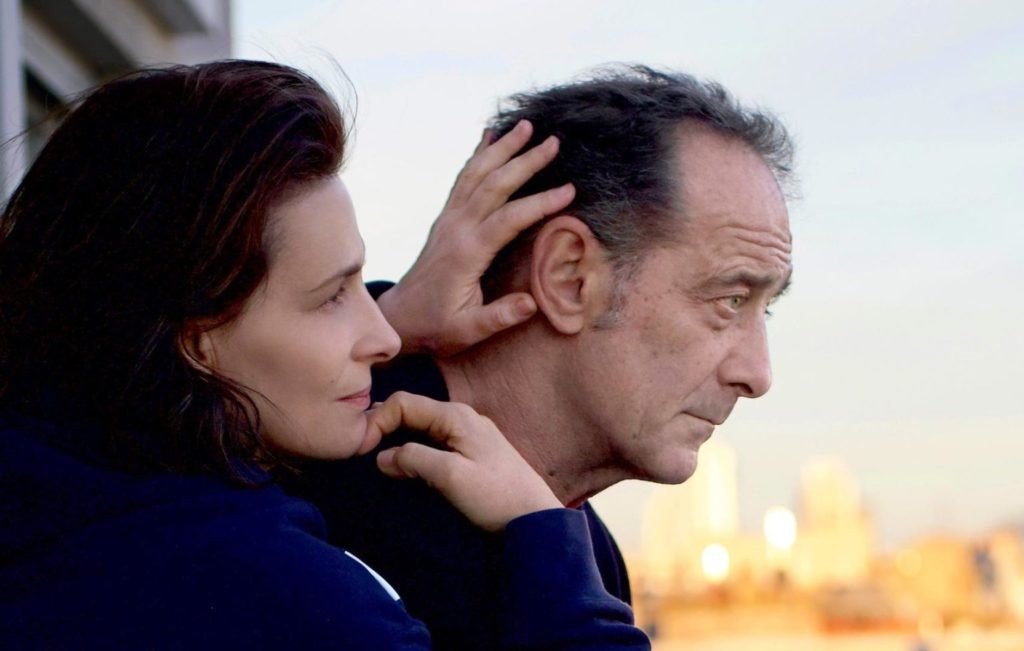Claire Denis’ Fire (Both Sides of the Blade) tells a pandemic adjacent story of a love triangle and the ripples of misguided and candid love.
I think most people remember the first time they watched a film by Claire Denis, one of the most vibrant filmmakers working today, due to the nature of her filmmaking. It’s minimalistic, but she has keen attention to the small concrete details of everyday life, which other directors would make as either trifling or unimportant. It is a requirement to see beyond what is said in her movies.
What’s also intriguing is the different methods to her work in the wide variety of drama and other genres as well. Indeed, many know of her long-awaited journey into space and the sci-fi genre, High Life (which was the first film I saw of hers), but Denis also ventured off to horror back in 2001 with her divisive romantic feature, Trouble Every Day. She has been working very hard during the last couple of years, working under the strict restrictions of the pandemic, to deliver two films this year (hopefully). The first one, Fire (or Both Sides of the Blade, which is the title that the director prefers, and it is taken off the title track by Tindersticks), marks a reunion with Juliette Binoche and Vincent Lindon, who both have worked with Denis before on a couple of projects.
Fire (Both Sides of the Blade) is set in Paris during the winter and follows a love triangle’s development (and renewal of sorts). The story follows a couple, Sara (Juliette Binoche) and Jean (Vincent Lindon), who has been in an affectionate and long-lasting relationship for almost ten years. Jean stands as Sara’s rock–someone to hold on to in good and bad times. He will always be there for her, and she knows that devotion is indeed what has kept this relationship afloat for as long as it has been.
Before they were a couple, Sara was living with François (Grégoire Colin), who was Jean’s best friend and admirer back when he played pro rugby. Both Jean and Sara haven’t heard of him in years, until, one day, Sara sees him in the street. He does not seem to notice her, but Sara starts feeling a definite premonition that her life would change in an instant, for better or worse. She doesn’t know if that foreboding will be a buoyant feeling, but she is overwhelmed by it as old feelings reignite. When François gets in touch with Jean to suggest they work together again, things start winding out of control, and peril is imminent.

There are two ways of how both film titles, Fire and Both Sides of the Blade, work in relation to the film’s narrative. Fire refers to Sara’s premonition once François comes back into their lives years after their separation and the increasing flare of the troubles arriving due to love, whether misguided or freehearted. On the other hand, Both Sides of the Blade could be seen as the two sides of the relationship and the incising agony of a near-impossible choice. Although the former is less oblique, the latter works better in terms of the story being told. Even the lyrics on the song of the same name by frequent Claire Denis collaborators Tindersticks reflect on the decisions Binoche’s character makes: “walk that line blind, try to do what’s right, but I’m falling down both sides.” The film introduces the two lead characters as they fool around on an unspecified beach; the light glints on the water, and passion and bliss emerge from the screen. These first interactions seem to be honeymoon phase-esque, as the atmosphere and scenario change once they get to their home in Paris.
Sara is a radio host and is happy with her marriage, albeit we soon learn that Jean has been struggling during the last couple of years. He served some time in prison for a crime that isn’t stated, and because of that, he lost the custody of his son from a prior matrimony, Marcus (Issa Perica). Jean’s now unemployed, and he depends on his lovely Sara and his mother (Bulle Ogier); Denis makes an interesting note of the empathy being shown and the portrayal of a hypermasculine man in such a condition.
This situation doesn’t start much of a fire in their household, but things begin to change once Sara sees her ex-lover after many years. Tension and fury are coming from both sides of the relationship upon his arrival, and it’s for different reasons. They tend to doublethink about the re-involvement of François into their lives once again. However, we all know that Sara, deep down, isn’t approving of it, by the looks of Binoche’s face (who displays innocence and integrity) and the closeups by cinematographer Eric Gautier. At the same time, in one scene, we see Sara demonstrating incandescent emotions for the old flame, and in another, she rejects Jean’s accusations with a convincing purity.
Perhaps that could be one side of the blade, or the fire added to the newly awakened flame–the other side revolving around their love for each other, the life they had without François involved in it. Feeling like a middle-aged rendition of François Truffaut’s Jules and Jim, Fire (Both Sides of the Blade)interestingly takes turns showing us the different sides of the love triangle–the perspectives of the members involved and how it affects every one of them.
Of course, this isn’t an original tale, and its ending is relatively impending, yet rarely do we see movies tackle a character, Binoche’s Sara, who is unashamedly selfish and desirous. Acting-wise, Juliette Binoche once again demonstrates that she’s one of the best French actresses in the world, delivering a resplendent performance, even though her character’s actions aren’t meant to be praised nor heralded. Some minor nitpicky aspects could have been dealt with in another fashion to fit the atmosphere of the narrative; nevertheless, Denis makes things work once again, even if this isn’t close to being her best work. Her team of frequent collaborators strives, most impressively Tindersticks, whose score heightens the movie as a whole.
Fire (Both Sides of the Blade) opened the 27th edition of “Rendez-Vous with French Cinema” at Films at Lincoln Center on March 3, 2022. The film is now available to watch on digital and on demand.

